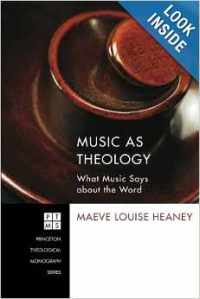Stuck In The Muddle: Music As Theology: What Music Says About The Word
Among a group of works on music I received as Christmas presents, I was eager to read Maeve Louise Heaney’s Music As Theology: What Music Says About The Word precisely because it offered itself as addressing a central concern of mine: Is it possible to understand music as offering people of faith a way to grasp the Christ-event for their lives? Before I finished the Introduction, I knew I would be disappointed. By the end, I came away wondering how a book as poorly organized, incomplete, and filled with errata as this even came to be published. This is not just a poorly written book. Presentation is important, and carelessness on the part of editors and publisher have left readers with more to struggle through than just bad writing. I have since learned fault for this last, the errata, lies squarely at the feet of the publisher, Wipf & Stock. The other errors, sad to say, lay wholly at the author’s feet.
On one level, the organization of the text seems intriguing. Heaney explores the limits of understanding music as language, although in such a way as to leave the reader wondering why this is an issue. After all, if as she also insists aesthetics has always claimed a way of understanding that sidesteps the many and varied offerings of philosophy, science, and theology, this question itself should be set to one side fairly quickly. Rather than jump in to aesthetics, however, Heaney offers first a chapter on hermeneutics without discussing hermeneutics or its role in understanding music. Instead, she starts talking about semiotics, rehearsing the distinction between “semiotics” and “semiosis”. In the next chapter, on semiotics, she does this again, in almost the same language, leading me to wonder if I had made some kind of mistake and was reading the same section again. By this point I think I looked a bit like this:
When she finally discusses aesthetics, I wasn’t at all surprised to find each author received a shorter treatment. By the time she reached Don Saliers, she seemed exhausted by the idea of presenting his many and varied contributions to the topic, giving him less than a full page. Considering Saliers has also written book-length considerations of music and theology, one would think he deserved more than the not-even-cursory treatment he receives.
What was most frustrating of all? In the midst of this organizational confusion and poor writing, Heaney occasionally offers glimpses of insight that seem to float out of the fog. I would think, “Hey! Now she’s getting somewhere!” And then the fog would descend again, and I was once again groping through the mists for something, anything, that showed she not only knew where she was headed, but was tossing bread crumbs to readers lost along the way.
I was sad reading this book, but as I told my wife, I was bound and determined to finish it. I had no intention of being defeated by a book. When I reached the end, I was satisfied that, at the very least, I knew not what to say should I ever try to write about music as theology.



You must be logged in to post a comment.